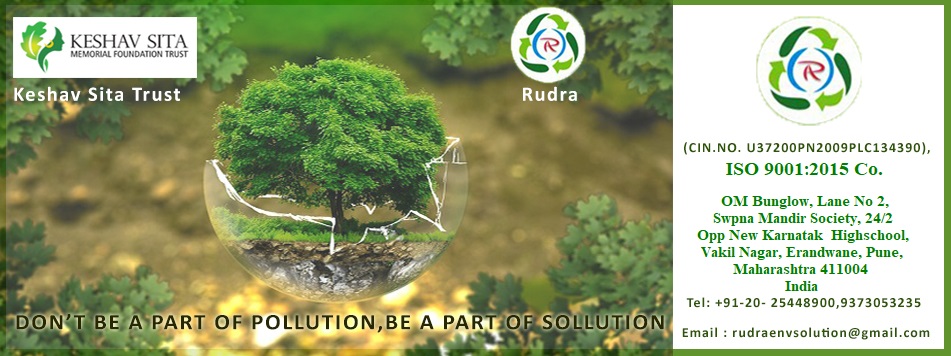- Rudra has tied up with Keshav Sita Memorial Foundation Trust
established on29th July 2009. Since the inception the company has been involved in research of converting waste plastic into fuel technology through TCD i.e. Thermo Catalytic Depolymerisation Process. The first pilot plant was established in March 2010, second-generation plant in 2013 and now its patented third generation plant is running successfully in company's own factory situated in Jejuri M.I.D.C. area. Company is ISO 9001-2008 certified.
Rudra has tied up with Keshav Sita Memorial Foundation Trust for creating awareness of segregation at source as well as pick up of waste plastic from various areas of Pune for last year and a half. At present, the collection happens from almost 12000 households, hotels and businesses.
Keshav Sita trust has been connecting with many societies by creating awareness of segregation at source by personally conducting meetings with flat holders and society committees as well as various hotels. This personal contact has helped the trust and Rudra to not only create awareness but to get the cooperation of an army of people who have started segregation and are giving the plastic to the Trust.
This gives Rudra an advantage; as the same model can be replicated and enhanced to reach more households and businesses. Rudra and Keshav Sita trust have work constructively over the period of almost Three years to develop good working relationship with all its stakeholders.
The promoters when on a visit to a wildlife sanctuary witnessed the death of a deer due to consumption of plastic. From 2009 onwards as a mission, Rudra has been researching and developing its Thermo Catalytic Depolymerization (TCD)technology.
1) Available in Batch Operations, Energy efficient technology
2) Self sufficiency for fuel consumption (typically for industrial/commercial) fuel requirement
3) No need for segregation of various types of plastic
4) Eco-friendly Process, no harmful gases/effluent produced with Well-engineered plants ensuring superior quality of Fuel
5) The plant can suitably be operated up to 50 % turndown and hence Fuel can further distilled
6) Eco-friendly Process, no harmful gases/effluent produced also the fuel produced used directly as a source for burning without any need for further processing.
7) This will result in diversion of waste plastic from the landfill and produce fuel with lower carbon footprint and hence Energy efficient and Zero emission process: no harm to the environment
8) Another important benefit of the Rudra process is the range and type of plastics it accepts for conversion, especially those plastics that are not suitable or are of high enough quality for recycling.
9) The waste plastic to fuel process produces very low emission, due to the capture of almost all of the output, both liquids and gases inside the system. In the process, Plastic heated as opposed toburned. The Sulphur content in the synthetic oil is usually less than 18 ppm, and used directly for burring without need of any further process.
10) The plastic otherwise headed for landfill converted to useable fuel by Rudra process; as landfill is the least sustainable waste disposal option.
The plant can be made in the capacity of 50 kg to 500 kg per shift (8hrs). We have been successful in processing all types of plastic waste. Rudra Environmental Solution (India) Ltd is ready to supply this plant to various Municipal Corporations, Municipal Councils and Grampanchayats at discounted rates as their social duty.





